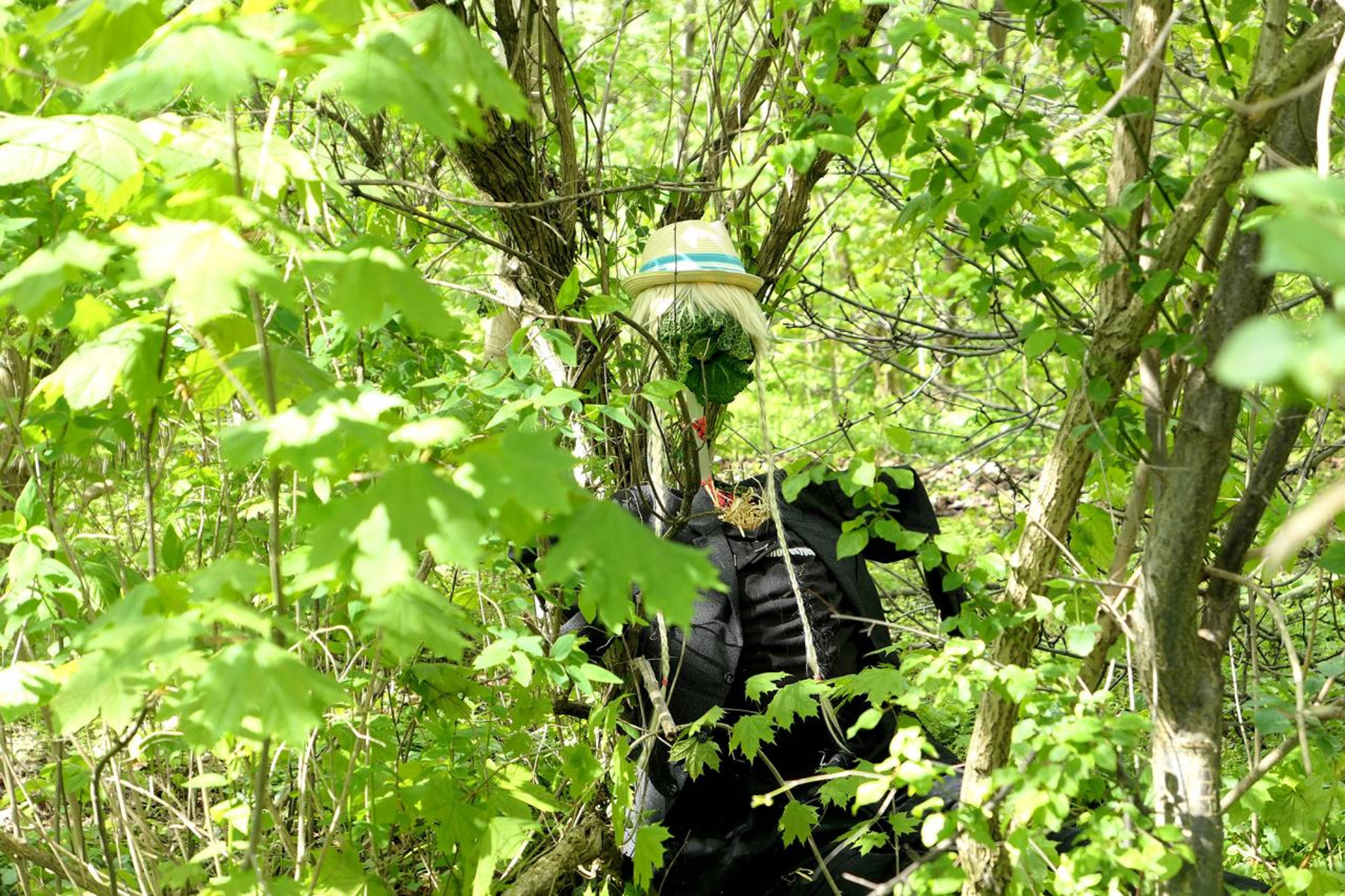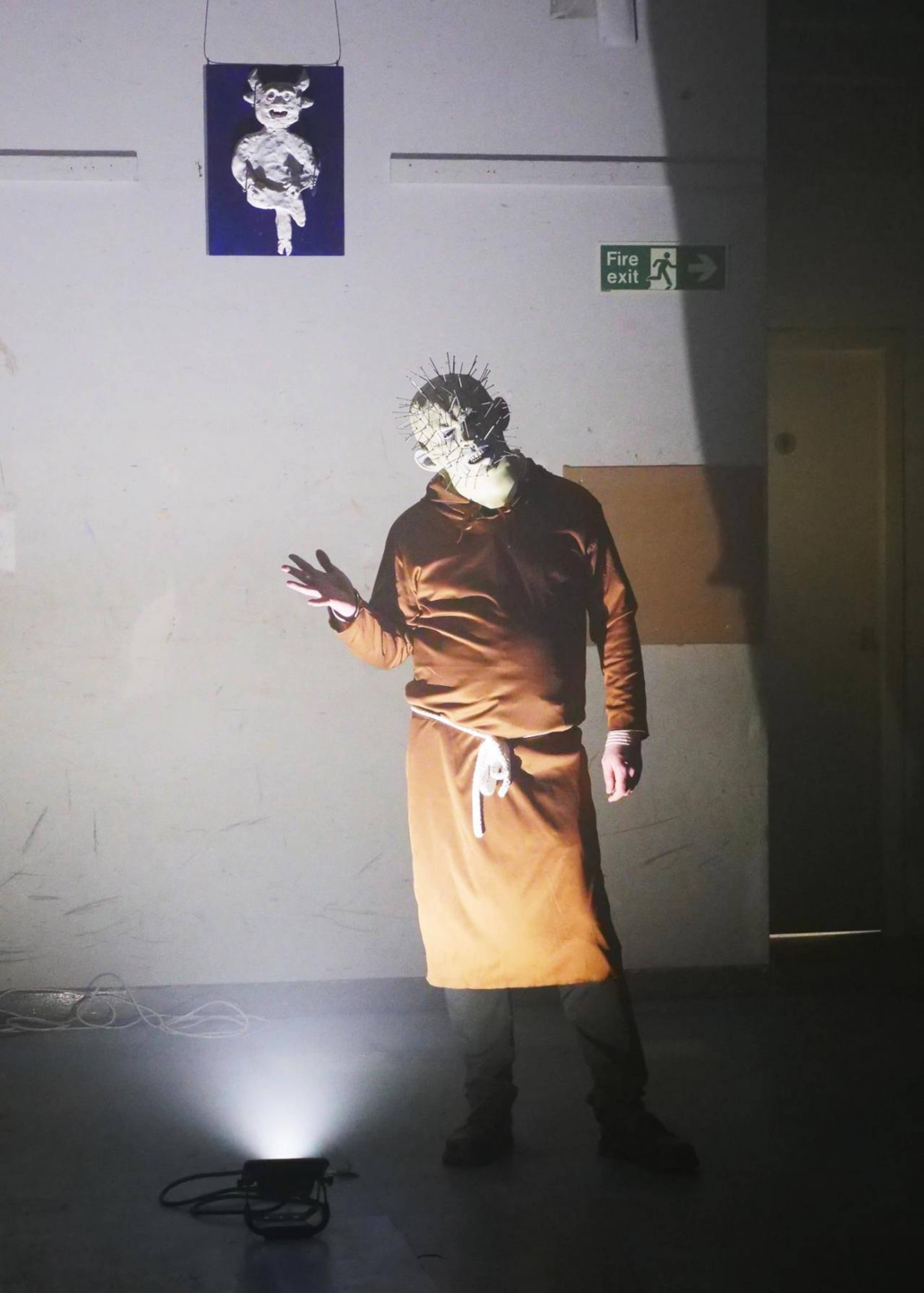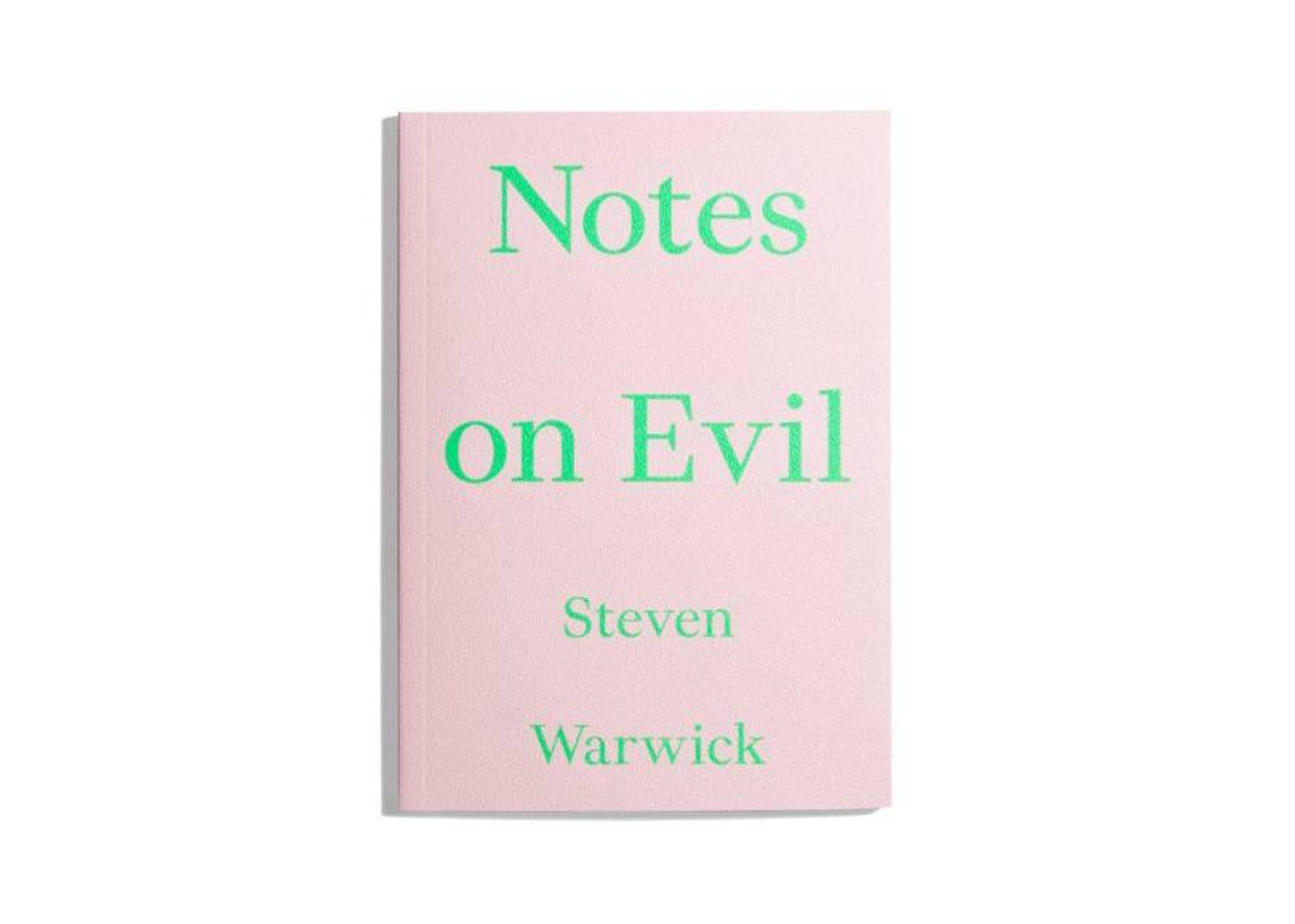Last weekend marked the series finale of TV Bar, the artist-duo Calla Henkel and Max Pitegoff’s outpost on Potsdamer Straße. Regulars paid respects over Negronis sbagliato, the crowd creeping down the block in both directions, sidewalk blockage temporarily un-verboten: a state of exception conjured for the sad, special occasion of the bar’s final night.
Sitting shiva that evening, I took a break from admiring the well-clad cast of characters that inhabit the TV Bar Expanded Cinematic Universe to chat with Steven Warwick, an artist and musician from the UK living in Berlin. Steven’s latest project is a book called Notes on Evil (Floating Opera Press, 2022), which consolidates threads he has explored in his music and performance art over the past several years. It all inquires into – what else? – evil: its construction, its libidinal pull, and its frequent, as Steven argues, (mis)use for moral surveillance and cultural sleights of hand.
Baruch Spinoza says, basically, that there are no morals, only ethics: no transcendent Good and Evil, just lower-case good and bad. We learn to tell them apart by what they do to our being; through whether they build us up or break us down. Practical considerations: is this joyful or poisonous? The night was bittersweet and guess I acted badly, at least in a Spinozist sense. The next afternoon, struck by a headache of unparalleled intensity, I find some koans from my chat with Steven jotted in my iPhone notes:
CIVILIZATION AND ITS DISCONTENTS
BOB DYLAN - KANYE
COMMUNISTS INVENTED THE SWIMMING POOL
REMEMBER, AYN RAND DIED SAD AND ALONE
Scraping the interior of my dehydrated cranium to reconstruct a book review from those fragments, the best I can conjure is a vague impression of TV’s tinsel-shrouded entryway and those famous last words, yes, sure, I’ll take another one. Lucky for me, Steven was kind enough to carry on our conversation the following evening.
Adina Glickstein: Your new book, Notes on Evil [2022], looks at how judgments of “good” and “bad” are socially produced and enforced. One of the threads that tracks throughout is how societies construct a repository for evil, housed in a specific, designated figure – as you put it, a scapegoat. Why are you interested in this figure?
Steven Warwick: I was thinking about this word, scapegoat, which had a bit of a resurgence again in the last years. I took that to be a reinforcement of people’s (often justified) anxieties – it was largely about a kind of uncertainty. Suddenly I felt like people got anxious, and then more anxious, and it just kind of kept happening. When people are anxious, they’re quite irrational, because their emotions take over. And I was thinking, well, what actually is evil? Evil is convenient. As a word to use, it’s simple just to be, like: “oh, I don’t like this, it’s EVIL.” It’s just a cognitive Band-Aid. That takes something away from its accountability, because if you say something is evil, it gives it a kind of religious connotation. Calling something evil ironically gives it way more power – it makes it almost godly. And then a scapegoat, I guess, kind of comes out of that. Like, when a complex problem is causing people grief, quite often, one person will act as a lightning rod for it. And then they’ll get struck down. And then people can just move on and be like: “okay, that’s gone now.” I’m quite disturbed by that pattern.
AG: There’s something choreographic to the way you explain it – this cycle or performance, almost like a dance.
SW: I’d really not thought about that before, but I think it’s a good point. Some of my interest in evil has heavily informed my performance work over the last few years, so the book was an accompaniment to a lot of visual work I’ve been making. I’d done a play with the musician and writer DeForrest [Brown Jr.], as Elevator to Mezzanine [2018], at KW Institute for Contemporary Art in Berlin. He and I are in it as two characters who get sent to hell.
AG: What does your personal hell look like?
SW: We’d just been crucified, and we just kind of sat there. And Pinhead was comforting us, being like, “yeah, purgatory, what’s that about?” Waltzing around, giving a monologue. And then I started playing this Radiohead song and we started singing. So it’s really quite absurd. In the book, I’m thinking about how, in culture in general, we’re drawn to the macabre, to something dark, something that scares us. I was also thinking about theater where there are a lot of grotesque masks, like commedia dell’arte. A lot of classical plays, or even the Bible, are really grotesque and horrific. And it’s sometimes used to scare you into certain behavior. Like a fairy tale, it teaches you a life lesson.
Steven Warwick, The Riddle of the Imp on the Mezzanine, performance view at ICA London and Reading International, 2019. Courtesy: the artist
AG: That component of moral education is also present, in a sense, in the cinematic examples you engage throughout the book. A section centers on The Shining [1980]. To speak of scapegoats: you told me last night that Alex Jones – both a victim and perpetrator of this pattern, maybe – is also obsessed with Stanley Kubrick. Why do you think that is?
SW: Both are quite into conspiracies, so I guess that makes sense. Once I was YouTubing clips of anything Shining-related. And Alex Jones popped up, which I guess makes sense, in a funny way. InfoWars was all about conspiracies and selling diet pills, and Kubrick was himself the victim of a lot of conspiracy theories – of people trying to interpret The Shining, because it’s a film which doesn’t really explain itself. It’s an odd film, it’s very dislocating ...
AG: Right, and how Kubrick “directed” the faked moon landings!?
SW: Exactly. And that’s somewhat bizarrely similar to Alex Jones. Kubrick received a lot of flak. People, to this day, still believe that he faked the moon landings. Making 2001: A Space Odyssey [1968[, Kubrick was quite savvy. He went to NASA, because he was obsessive with lenses, and he knew that the only way to get this special lens he wanted was to develop it with them. But somehow, it way easier to just believe that he clearly faked the moon landings, because how else would he get access to this technology? There’s also a part in the book where Reagan was apparently really disappointed when he became president and found out that the War Room didn’t look like it does in Dr. Strangelove [1964].
It isn’t reality, a film, it’s not like watching the news. It’s allowed to talk about things that you might not agree with.
AG: I really loved that moment, because it made me think about how profoundly cinema shapes our expectations of the world. Probably more so, for most people, than religion. So, to bring it back to good and evil – I wondered if you feel like film itself can be a tool of moral education?
SW: When Kubrick was responding to the controversy around A Clockwork Orange after it got trapped in the culture wars around violence in television, he said something along the lines of: “I don’t think the primary use of cinema has got to be anything other than a work of art.” But then, in his films, he’s constantly playing with that. In a way, cinema just acts like a comforter, to help us process reality. But it shouldn’t be a stand-in for reality. It isn’t reality, a film, it’s not like watching the news. It’s allowed to talk about things that you might not agree with. If you choose to represent something which you really disagree with on a moral, ethical, or political level, that doesn’t mean that you’re endorsing it. There’s a huge problem with this weird conflation, as if people are unable to tell the difference. Like when Michel Houellebecq wrote Submission and so many people hated it. I admittedly didn’t bother with it for a few years, because I thought, oh, it’s just reactionary, or whatever. But the real point with that book is that it doesn’t matter whether you like it or not, or if you find it offensive or not. It actually was doing exactly this staging of “evil” and unpacking how that was manifested.
AG: Did you grow up religious? Or, what collective practices or institutions were important in forming your own moral coordinates?
SW: I didn’t grow up religious – not in an active way. I wasn’t baptized. I remember, on my first day of school, we had to say the Lord’s Prayer, and everyone just closed their eyes and put their hands together. I literally had no idea what was happening; I was just looking around in disbelief, thrown into this weird institution where everyone’s just saying all these codes. That’s probably stuck with me, that feeling of bobbing my mouth up and down. When we went to church and they were passing around the charity collection, I had no idea what it was. I had no concept of charity, because I was a child, so instead I took some money from it. My teacher asked if I enjoyed church and I was like, “Yeah, it’s great! They give you money!” She was very performatively clutching her pearls, mortified. And, of course, she made me into an example of how not to act, how not to behave.
AG: You told me recently that you were a choir boy, “but for capitalist reasons.”
SW: Oh, yeah. My friends at school were all singing in the choir and they all always bought loads of sweets. They told me if I did both the weddings and the funerals, the choir boy gig paid quite well. People would walk past us while we were performing and say things like, “Oh, these children, they’re so angelic.” But we were all kind of in it for the money.
AG: What do you make of this heavily remarked-upon trend where young people – maybe also for capitalist reasons; maybe in earnest search of some kind of moral certitude – are getting, performatively or sincerely, who knows, into Catholicism?
SW: This neo-trad kind of thing would certainly make sense in an unstable world. It offers structure – having God, and, like, reading the Good Book. I’m personally quite interested in born-again musicians. Like when Bob Dylan claimed to have born-again Christian faith. This was the late 1970s, early 80s. He did three records in that period, maybe – Saved, Shot of Love, and Slow Train Coming. I was really interested in this perverse gesture. What is he doing? Is he trying to get the middle-American evangelicals on his side? Or was it some delayed consequence from his motorbike accident that he found God? You could say the same with Kanye. He had a car accident and got religious. I don’t know what’s going on there. In the case of Bob Dylan, what interests me was that it was, I think, completely a performance. He actually renounced all of it later, and was like, “I actually think music is religion for me. That’s the closest I can get to spiritual experience.”
Steven Warwick, Notes on Evil, 2022. Courtesy: Floating Opera Press
___
Steven Warwick’s Notes on Evil is available for purchase from Floating Opera Press.




